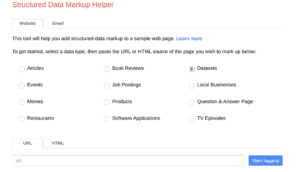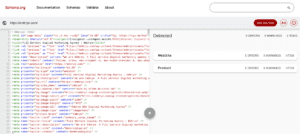Adding the right Schema to relevant pages is an important technical SEO activity. Implementing Schema gives search engines context behind your content, which is incredibly valuable in the age of voice search and generative AI.
These various special codes enable Google to interpret and display content in useful and engaging ways on the results pages. Not only does this improve user experience, but your website is likely to benefit from higher click-through rates, improved visibility and better rankings.
Whilst this practice is highly encouraged to improve organic performance, there are wrong schema types of ‘schema spamming’ that SEOs should be aware of.
Let’s find out more about the different types of schema markup and how they can impact your performance.
How to implement different types of schema markup
There are now almost 800 types of schema with 3 most common encoding formats hosted on Schema.org. These formats include:
- JSON-LD
- Microdata
- RDFa
The quickest and easiest way to source these codes is by using Google’s Structured Data Markup Helper. This tool allows you to search for the type of content you want to markup, input the URL and generate the appropriate coding. From here you can add the code to the HTML of the webpage.

Whilst it can be tempting to input schema codes from anywhere and everywhere, the best practice is to apply only one relevant schema per page. If you want to maximise your chances of ranking for any rich result, you should add a schema that best suits the search intent.
As an example, a page dedicated to commonly asked questions should solely implement FAQ schema. This clarifies the exact context of the page and helps Google rank it for question-based keywords. Adding conflicting schema codes can do more harm than good, so steer clear of adding schema for the sake of it.
Organisation Schema Markup
Google refers to organisation schema to get useful information about a business name, logo, address, affiliates, social media profiles and more.
Organisation schema is needed in order to have your business appear in a knowledge panel in the search results. Why does that matter? Knowledge panels deliver information fast, and can vastly increase click-through rate.
- Any registered entity should look to implement organisation schema to their homepage or ‘about us’ page.
- According to Google’s guidelines: “You can put this markup on any page, though it may make sense to have it on your homepage. You don’t need to put it on every page.”
- Google’s recommendation is to use the JSON-LD markup format. You can add this in the <head> section of the page.
- Make sure the information is as up-to-date and accurate as possible. Add as much as you like to improve credibility.
Product Schema
Product schema involves marking up the products on your website with one of the three main types of codes.
As part of an e-commerce SEO strategy, you should be looking for ways to make your pages eligible for rich results. If you implement this schema, your product pages have a higher chance of showing up for commercial and transactional keywords.
- The schema markup should include details on the product name, size, availability, price, description and brand.
- User experience is heightened when product schema is effectively implemented. They get instant results from searching for specific products in Google, without having to dig deeper.
- JSON-LD is the most commonly used format.
Review Structured Data
Review schema markup enables websites to use social proof to boost their credibility and trustworthiness online. It’s no secret that reviews and testimonials make a huge impact on buyer decisions, which is why reviewing structured data is a useful code to have.
With review schema in place, you can display user reviews and star ratings in the SERP. It uses real feedback and reviews from various sources to help potential customers see the legitimacy of your business.
- John Mueller once Tweeted: ‘ You can’t mark up 3rd party reviews with structured data, but feel free to show them on your site without the markup.’
- Experts suggest only marking up reviews that are complete, accurate and thorough.
Article Schema
Around 7.5 million blogs are posted on the internet each day. That’s a lot of content to compete against.
One way to stand out and optimise your blog content for SEO is to add article markup to news and insights.
Adding this schema is an impactful way of providing search engines with contextual information about the content to help them serve it up to users in a valuable way.
- Article schema presents more detail about the blog author, post date and relevancy in the SERP.
- NewArticle and BlogPosting are the two most popular types of article schema.
- Offering a bigger snippet to users before they click through to your blog improves engagement and traffic.
- Common properties for this schema include the headline, date published, author name, images and body text.
How-to Schema
HowTo schema is a great way to get your content in front of people using voice search to access fast results.
When instruction-based blogs are correctly marked up, they have a stronger chance of securing a rich result.
- Structure your content to include a step-by-step format using H2s and H3s.
- Properties include estimated cost, duration, tools, yield and more.
Author Structured Markup
Having an E-E-A-T (Expertise, Experience, Authoritative, Trustworthiness) friendly site should be a priority for 2024 and beyond.
Google’s own guidelines state that it is more important than ever that websites are transparent and open about the authors behind their content. Author-structured markup is just one component of ticking all the E-E-A-T boxes.
This schema markup informs search engines of the page author’s credentials, ultimately helping them to identify whether or not they are ‘qualified’ to be creating open content for users.
- Author schema can be applied to AMP (accelerated mobile pages) and non-AMP pages.
- Schema markup can be added to author bio pages to reinforce the credibility of your content creators.
- KnowsAbout is a similar schema that can be used to demonstrate the author’s industry knowledge and experience.
- ReviewedBy is another type of author Schema that is useful for guest writers and authoritative contributors.
Local Business Markup
Any local business is missing a trick if they aren’t implementing schema markup. This structured data uses geo coordinates to list your business in local searches.
If you’ve ever searched ‘cafes near me’, you’ll be familiar with the rich results presented to you.
As part of a wider local SEO strategy, schema is just one tactic to raise keyword rankings.
- Local landing pages can be marked up to help improve visibility and rankings.
- This schema can be applied to a wide array of industries including law, hospitality, health and education.
- Properties within the schema allow you to display opening times, website links, phone numbers etc.
How to find the right schema markup types
There are over 30 common ways in which Google can display the various rich snippet markup types in any given search result page. With this in mind, it might feel difficult to figure out what structured data your website lacks and would benefit from.
Organise your content types
As we’ve covered, there are hundreds of schemas to choose from that apply to different pages. Start by categorising your pages into types, for example:
- Company details (homepage, about us page, terms and conditions)
- Blog content
- Video content
- FAQs
- Review page
This will help you bucket your pages into schema types and work out which content is most valuable to your website. You can also use this method to identify areas that need an extra boost in rankings and visibility.
Do some competitor research

What are your competitors implementing? How do they currently rank and what rich snippers do they feature in? Whilst you won’t get ahead if you do a direct copy, this kind of research will help you discover gaps and opportunities.
Use a Schema Markup Validator tool to find this information and figure out exactly what schemas your competitors have utilised.
Assess your current keyword rankings
If you have articles that are struggling to rank, do a quick Google search to see what kind of results are presented. If you notice anything unique about the display, you might be missing out on some markup codes.
For recipes, how-to guides, video embeds etc., it’s a good idea to ensure schema is added.
At Embryo, our technical SEO specialists are clued up on all possible schemas. Leave the identification of untouched schemas and opportunities to us – contact us today.
Leave the identification of untouched schemas and opportunities to us
At Embryo, our technical SEO specialists are clued up on all possible schemas. If you need support with your schema work, we can help!
FAQs
Answered by Jamie Beatty
Where is the best place to position the schema code?
The best place to add schema code is either within the <head> or <body> section of your HTML.
What is the difference between the schema formats?
The main schema formats are Microdata, RFDa, and JSON-LD, with JSON-LD being the preferred choice.
Why would Google think my schema code is spam?
Google may flag your schema as spam if it is misleading, irrelevant, or includes content not visible on the page.
Is schema markup just as impactful as keyword targeting?
Implementing schema markup enhances visibility and context for search engines but it’s not as impactful as keyword targeting.
Is schema markup a part of semantic SEO?
Yes. schema markup is important when it comes to semantic SEO as it helps search engines understand the content context and relationships.














